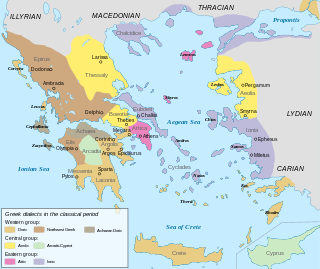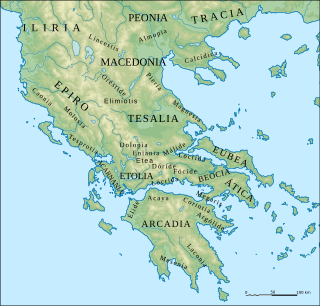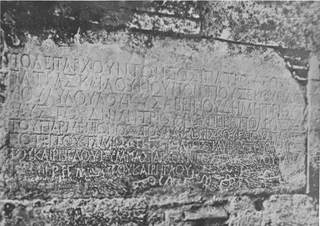Related Research Articles

Amyntas I was king of the ancient Greek kingdom of Macedonia from at least 512/511 until his death in 498/497 BC. Although there were a number of rulers before him, Amyntas is the first king of Macedonia for which we have any reliable historical information. During Amyntas' reign, Macedonia became a vassal state of the Achaemenid Empire in 510 BC.

Macedonia, also called Macedon, was an ancient kingdom on the periphery of Archaic and Classical Greece, which later became the dominant state of Hellenistic Greece. The kingdom was founded and initially ruled by the royal Argead dynasty, which was followed by the Antipatrid and Antigonid dynasties. Home to the ancient Macedonians, the earliest kingdom was centered on the northeastern part of the Greek peninsula, and bordered by Epirus to the southwest, Illyria to the northwest, Paeonia to the north, Thrace to the east and Thessaly to the south.

Philip II of Macedon was the king (basileus) of the ancient kingdom of Macedonia from 359 BC until his death in 336 BC. He was a member of the Argead dynasty, founders of the ancient kingdom, and the father of Alexander the Great.

Doric or Dorian, also known as West Greek, was a group of Ancient Greek dialects; its varieties are divided into the Doric proper and Northwest Doric subgroups. Doric was spoken in a vast area, including northern Greece, most of the Peloponnese, the southern Aegean, as well as the colonies of some of those regions in Cyrene, Magna Graecia, the Black Sea, the Ionian Sea and the Adriatic Sea. It was also spoken in the Greek sanctuaries of Dodona, Delphi, and Olympia, as well as at the four Panhellenic festivals; the Isthmian, Nemean, Pythian, and Olympic Games.

Antipater was a Macedonian general and statesman under the successive kingships of Philip II of Macedon and his son, Alexander the Great. In the wake of the collapse of the Argead house, his son Cassander would eventually come to rule Macedonia as a king in his own right.
The Pella curse tablet is a text written in a distinct Doric Greek idiom, found in Pella, the ancient capital of Macedon, in 1986. Ιt contains a curse or magic spell inscribed on a lead scroll, dated to the first half of the 4th century BC. It is held in the Archaeological Museum of Pella. It was published in the Hellenic Dialectology Journal in 1993. The Pella curse tablet exhibits some of the typical Northwest Greek features, as well as a cluster of unique Doric features that do not appear in other subdialects of this family. It represents the same or a very similar vernacular dialect that is also attested in the other Doric inscriptions from Macedonia. This indicates that a Doric Greek dialect was not imported, but proper to Macedon. As a result, the Pella curse tablet has been forwarded as an argument that the Ancient Macedonian language was a dialect of Northwest Greek, and one of the Doric dialects.
Harpalus, son of Machatas, was a Macedonian aristocrat and childhood friend of Alexander the Great in the 4th century BC. Harpalus was repeatedly entrusted with official duties by Alexander and absconded with large sums of money on three occasions. Alexander appointed him treasurer of his empire in Babylon in 330 BC. In 324 BC he fled from Babylon to Athens with a large sum of money. The resulting political controversy in Athens was a contributing factor in the Lamian War.

The Thesprotians were an ancient Greek tribe, akin to the Molossians, inhabiting the kingdom of Thesprotis in Epirus. Together with the Molossians and the Chaonians, they formed the main tribes of the northwestern Greek group. On their northeastern frontier, they neighbored the Chaonians and on their northern frontier they neighbored the kingdom of the Molossians. The poet Homer frequently mentions Thesprotia in the Odyssey, which had friendly relations with Ithaca and Doulichi. The Thesprotians originally controlled the Dodona oracle, the oldest religious shrine in Greece. Later, they were part of the Epirus until they were annexed into the Roman Empire.
In Greek mythology, Makedon, also Macedon or Makednos, was the eponymous ancestor of the ancient Macedonians according to various ancient Greek fragmentary narratives. In most versions, he appears as a native or immigrant leader from Epirus, who gave his name to Macedonia, previously called Emathia according to Strabo, which according to Marsyas of Pella was until then a part of Thrace.
Medius or Medeios, son of Oxythemis, was a native of Larissa in Thessaly, an officer and friend of Alexander the Great, and a senior commander under Antigonus I Monophthalmus.

Funeral Games is a 1981 historical novel by Mary Renault, dealing with the death of Alexander the Great and its aftermath, the gradual disintegration of his empire and the start of the Wars of the Diadochi. It is the final book of her Alexander trilogy.
Osbe was an ancient town in North Chalcidice, probably between Mygdonia, Mounts Cholomon, Cissus and Bottike. It was later incorporated in Thessalonica,. Its only known citizen is Ἀνδρέας Ἄνδρωνος Ὀσβαῖος Andreas, Andronos Osbaios c. 400-350 BC who died in Beroea.

Tymphaea or Tymphaia was an ancient Greek territory, specifically located in the region of Epirus, inhabited by the Tymphaioi, a northwestern Greek tribe that belonged to the Molossian tribal state or koinon. The tribal territory was annexed by and became a province of the Kingdom of Macedon, specifically Upper Macedonia, in the 4th century BC.

Politarch was a Hellenistic and Roman-era Macedonian title for an elected governor (archon) of a city (polis). The term had been already attested in the Acts of the Apostles (17:6,8) concerning Thessalonica, as well in modern archaeology. The institution is called Politarchate and the variant ptoliarchos appears in a poetic epigram. The first evidence of the title is dated to the reign of Perseus in Amphipolis, where the king with two politarchs honoured Artemis Tauropolos after a Thracian campaign. One of the earliest extant inscriptions to use the term "Politarch" was located on the Vardar Gate in Thessaloniki. The Gate was unfortunately destroyed in 1876 but the inscription, which dates to the 2nd Century AD, can now been seen in the British Museum in London.

Heracles Kynagidas was the patron god of hunting in the Macedonian Kingdom, to whom hunting trophies were dedicated. The epithet was also attributed to "Artemis Kynago" Κυναγὼ, in its female form.

The Argead dynasty, also known as the Temenid dynasty was an ancient Macedonian royal house of Dorian Greek provenance. They were the founders and the ruling dynasty of the kingdom of Macedon from about 700 to 310 BC.
Among the famous ex votos of Delphi was that of Craterus, friend and general of Alexander the Great, attributed to Lysippos.

The first government of ancient Macedonia was established by the Argead dynasty of Macedonian kings during the Archaic period. The early history of the ancient kingdom of Macedonia is obscure because of shortcomings in the historical record; little is known of governmental institutions before the reign of Philip II during the late Classical period. These bureaucratic organizations evolved in complexity under his successor Alexander the Great and the subsequent Antipatrid and Antigonid dynasties of Hellenistic Greece. Following the Roman victory in the Third Macedonian War over Perseus of Macedon in 168 BC, the Macedonian monarchy was abolished and replaced by four client state republics. After a brief revival of the monarchy in 150–148 BC, the Fourth Macedonian War resulted in another Roman victory and the establishment of the Roman province of Macedonia.
In Greek mythology, Pierus was the king of Emathia in Macedonia. He was the eponym of Pieria and Mt. Pierus. Pierus was credited to be the first to write in the praise of the Muses.
References
- ↑ Die Staatsverträge des Altertums by Hermann Bengtson, Robert Werner, Deutsches Archäologisches Institut. Kommission für Alte Geschichte und Epigraphik pag. 109- 113 ISBN 978-3-406-02694-2
- ↑ Greek personal names By Elaine Matthews, Simon Hornblower, Peter Marshall Fraser, British Academy pages 99-119 ISBN 0-19-726216-3
- ↑ SEG 25:18
- ↑ except Aeropus but the text is corrupted
- ↑ IG I³ 89
- ↑ or Hadymos (Adymus of Beroea sculptor)
- ↑ the term is repeated for another name in the corrupted text
- ↑ Meletemata 22, Epig. App. 88
- ↑ Actes de vente d'Amphipolis By Miltiades Chatzopoulos, Page 38 ISBN 960-7094-79-4
- ↑ Meletemata 11 K31, SEG 36:626
- ↑ Macedonian Institutions Under the Kings by Miltiades Chatzopoulos page 151 ISBN 960-7094-89-1
- ↑ Meletemata 22, Epig. App. 79, SEG 29:608
- ↑ Macedonian Institutions Under the Kings by Miltiades Chatzopoulos page 151 ISBN 960-7094-89-1
- ↑ SEG 49:750
- ↑ SEG 52:617
- ↑ Epidauros — c. 365-311 BC IG IV²,1 94 frg b.col I.1 -9
- ↑ Martial, Buch VI: Ein Kommentar by Farouk Grewing
- ↑ Macedonian Institutions Under the Kings Page 211 By Miltiadēs V. Chatzopoulos ISBN 960-7094-89-1
- ↑ Phokis — Delphi — stoichedon — FD III 5:19.74
- ↑ Phokis — Delphi — stoichedon — FD III 5:58.29-30
- ↑ SEG 25:705
- ↑ SEG 43:363, C
- ↑ SEG 49:671
- ↑ SEG 43:363, E
- ↑ SEG 49:755
- ↑ SEG 43:363, B[1]
- ↑ SEG 49:776
- ↑ SEG 46:831
- ↑ SEG 38:647
- ↑ SEG 35:735
- ↑ SEG 32:642
- ↑ SEG 48:820
- ↑ SEG 49:754
- ↑ EKM 1. Beroia 147 SEG 40.534
- ↑ SEG 44:535
- ↑ SEG 35:775
- ↑ SEG 48:874
- ↑ SEG 27:299
- ↑ SEG 33:556
- ↑ SEG 35:781
- ↑ SEG 40:541
- ↑ SEG 35:780
- ↑ FD III 4:405
- ↑ SEG 35:796
- ↑ SEG 24:543
- ↑ IG XI,2 145, 51, IG XI, 2 154, 35
- ↑ SEG 27.265, A — SEG 30.558
- ↑ EKM 1. Beroia 3, SEG 12.311; 43.379 — Meletemata 22,2 (1996) 28, 8
- ↑ Phokis — Delphi FD III 1:477.13
- ↑ Phokis — Delphi BCH 1928:259.26
- ↑ BCH 18 (1894) 433,7
- ↑ SEG 39.575
- ↑ SEG 38.587
- ↑ ID 298, 10-39
- ↑ SEG 50:629
- ↑ EKM 1. Beroia 203, SEG 30.562